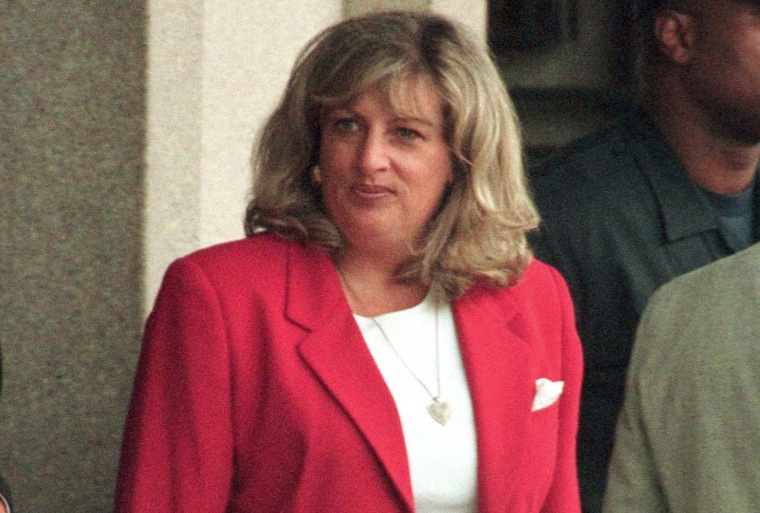Tripp, whose secretly recorded conversations with Monica Lewinsky became the catalyst for the impeachment of President Bill Clinton, was battling cancer.
 Linda Tripp leaves Federal Court after testifying before the grand jury on on July 28, 1998.Mark Wilson / Reuters file
Linda Tripp leaves Federal Court after testifying before the grand jury on on July 28, 1998.Mark Wilson / Reuters fileApril 8, 2020, 4:52 PM CDT / Updated April 8, 2020, 5:28 PM CDT
By Doha Madani
Linda Tripp, the former White House employee who became a key figure in the impeachment of President Bill Clinton, died at age 70.
Tripp, who was battling cancer, died Wednesday, according to her former attorney Joseph Murtha. Reports of Tripp's condition surfaced earlier in the day after her daughter, Allison Trip Foley, wrote about her mother being gravely ill in a now-deleted Facebook post.
Diane Spreadbury, a close friend of Tripp, told NBC News that it was great loss and Tripp was "a fantastic friend." Tripp's official cause of death is unknown, but Spreadbury told NBC News it was not coronavirus related.
Tripp secretly recorded her calls with then-White House intern Monica Lewinsky, tapes that paved the way for Clinton’s 1998 impeachment for obstruction of justice and perjury about his sexual relationship with Lewinsky.
The tapes were part of independent counsel Kenneth Starr's investigation into Clinton, producing a 453-page report that determined the grounds for impeachment. Tripp was indicted on criminal wiretapping charges in Maryland for the tapes, but the case against her was eventually dropped.
Lewinsky offered well wishes to Tripp on Wednesday after seeing reports that Tripp was ill.
“no matter the past, upon hearing that linda tripp is very seriously ill, i hope for her recovery,” Lewinsky wrote. “i can’t imagine how difficult this is for her family.”
no matter the past, upon hearing that linda tripp is very seriously ill, i hope for her recovery. i can’t imagine how difficult this is for her family.
Tripp began working in the White House as a secretary under President George H.W. Bush and stayed on after Clinton took office. She was transferred to the Pentagon in 1994, where she first met Lewinsky.
Tripp spoke publicly about her role in the presidential scandal during a National Whistleblower’s Day event at Capitol Hill in 2018. The former civil servant defended her actions and said that her decisions came from a duty to hold power accountable.
“And yet it had nothing to do with politics, which is hard for anyone to understand if they remember the story many years ago,” Tripp said. “What it was about was exposing perjury and obstruction of justice.”
Tripp is survived by her husband, Dieter Rausch, and her two children.
NBC News